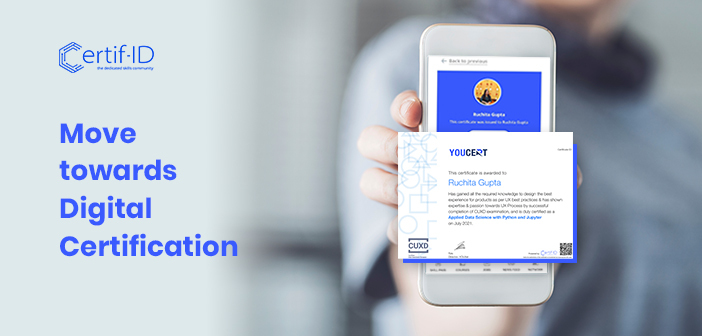In the previous blog, we learned about Ethereum Blockchain-based digital certificates, the history of Blockchain and why it is growing to be one of the most sought-after technologies. In this blog post, we will discuss the use cases of digital certificates, how blockchain helps in tackling fake certificates, and how you can start issuing digital certificates effortlessly.
The adoption of digital certificates is becoming more prevalent in the market, as it provides a measure of security, scalability, authenticity, reliability, and trust. These are used to verify the authenticity of websites, computers, land parcels, educational documents, insurance coverage and more.
Use cases of digital certificates
Digital certificates are employed to secure data, which can be anything from your credit card information to digital currency. The certificate is essentially a seal of approval that encrypts the information and only allows the intended recipient to decrypt it. It’s like having an envelope that can only be opened by the sender or receiver. Certificates are usually applied to files that are transmitted electronically, but they can also be applied to physical items such as wristbands at events.
One of the most important use cases for digital certificates is authentication. And, it allows issuers to build a centralised database of records without having to build a central server. An issuer can issue hundreds of digital certificates at a time. For example, an educational institution can issue an entire batch of students their certificates remotely, as part of one single transaction. The issued digital certificates will be part of the blockchain network forever, accessible to those with permission.
Lightweight, cost-effective and available 24/7, digital certificates are rising to be a critical part for protecting the security of certificates. Why?
- Traditional records are usually held as paper files that can deteriorate over time. They are vulnerable to loss or theft. By storing the records as digital certificates on a blockchain, the issuer can safeguard them from damage and destruction.
- Records such as warranty coverage, land papers, educational transcripts, etc., can be easily shared and verified with third parties (companies, government agencies and colleges, universities).
- Storing records in a decentralized system gives issuers more control over how they’re viewed and verified. Applying analytics, the issuer can track digital certification trends and uncover new business opportunities.
Some of the most common types of certificates that can be issued as digital certificates are driver’s licenses, passports, educational certificates, land documents, COVID-19 vaccination certificates and social security cards.
The paper counterparts for these documents are generally accepted as being legitimate. But, it is possible to fake them – paper-based records are not fool-proof. And, a certain way to secure them and ensure that they cannot be forged or modified is by issuing the certificates using blockchain technology.
 Tackling fake certificates using blockchain technology
Tackling fake certificates using blockchain technology
One of the biggest hurdles for officials is to differentiate fake certificates from real ones. Forged certificates (soft copy and hard copy) can be bought from the internet at cheap prices. This leads to uncertainty and doubt regarding the credibility of the document source. Although there are traditional methods to check for fake certification, they are not 100% dependable. Moreover, the whole process is time-consuming and cost intensive.
The solution to this problem lies in the implementation of blockchain technology. Issuing traditional records as digital certificates on blockchain is the best way to tackle the rising concern of fake certificates or documents. When a company issues a digital certificate on blockchain, it can be verified instantly, by clicking on the verification link or scanning a QR code.
How to issue digital certificates on blockchain?
Issuing a digital certificate on blockchain is not a challenge. You will not need to invest in new software or hardware. All you need to do is use a platform, like Certif-ID, that is already available in the market.
Certif-ID is an end-to-end platform that is accessible anytime, from anywhere, on any device to issue blockchain-based digital certificates. The Certif-ID platform is revolutionizing the certification landscape by helping companies, government agencies, corporations, educational institutions and other entities to contactlessly issue digital certificates with a single click.
Through Certif-ID, organisations are replacing extensive manual processes involved in issuing paper certificates, tracking and verifying the pre-issued certificates. They are reducing their operational inefficiencies and errors while improving their time efficiency.
The digital certificate issued via Certif-ID holds an unchangeable verification link and QR code. So, when the digital certificate is shared and viewed by any third person or party, it can be instantly verified without troubling the issuing body. And, the person presenting the digital certificate can prove their ownership with greater accuracy.
If you wish to know more about the blockchain powered digital certificates, please visit: https://nationalskillsnetwork.in/certif-id/
Overall, by issuing tamper-proof digital certificates on Certif-ID’s blockchain framework, issuers can establish the much-needed trust, transparency and accountability back to the certification process.
To know more, feel free to write to us or book a demo.





